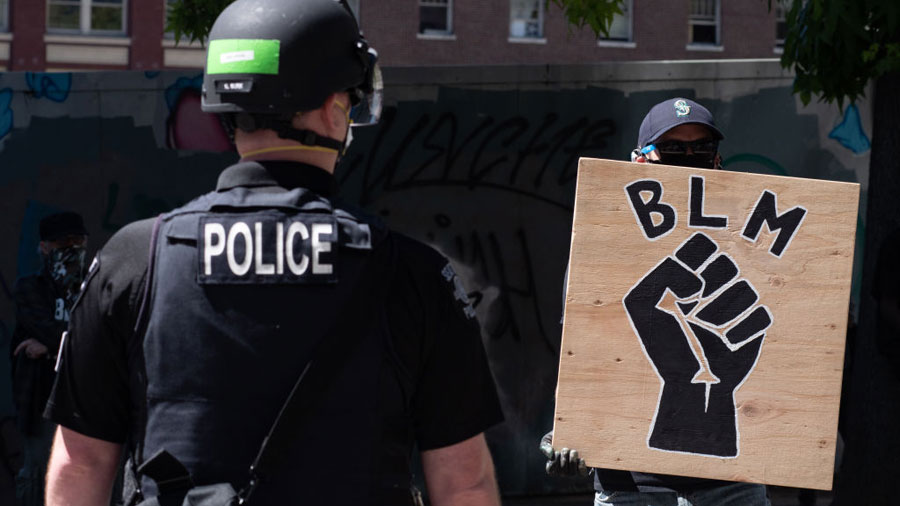Lawmakers, reform advocates clash over next phase of state’s policing ‘fix’ bills
Feb 18, 2022, 6:54 AM | Updated: 9:18 am

(Getty Images)
(Getty Images)
When the legislative session got underway in January, there was near universal agreement from lawmakers on both sides of the aisle that police accountability laws passed in 2021 were in need of fixes.
Battle over changes to state’s new police accountability laws heats up
Those 2021 bills represented a massive overhaul of policing in Washington, passed as a direct response to the murder of George Floyd by Minneapolis police and the ensuing protests, as well as the murder of Manuel Ellis by Tacoma police, and the loved ones of others killed by law enforcement in Washington.
But it quickly became apparent that those new laws had unintended consequences rippling through the state, as some police agencies began to stop answering certain types of calls, such as assisting with mental health calls involving the Involuntary Treatment Act, or engaging in vehicular pursuits. That led to what law enforcement described as an even larger public safety crisis over what they said was a lack of clarity from the newly-passed legislation.
An official opinion from state Attorney General Bob Ferguson last month confirmed what law enforcement had been saying – that a lack of clarity in the law regarding use of force and detentions caused confusion surrounding what was allowed and not allowed by officers, and strongly urged lawmakers to clarify its intent.
That opinion read, in part:
LAW ENFORCEMENT—POLICE—SHERIFF—Use of “physical force” by law enforcement
- The term “physical force” is not defined in E2SHB 1310 or in the law more generally, and therefore there is significant uncertainty as to its meaning. The most natural reading of the statute’s plain language is that physical force includes all acts by officers that involve violence, compulsion, or constraint used against another person’s body, even if it is unlikely to cause pain or injury. However, physical touch that occurs in the course of rendering aid would generally not be physical force, provided the individual receiving assistance is not resisting.
- While the answer is unclear, the more likely reading of E2SHB 1310 is that officers may only use physical force under the circumstances listed in the statute. Therefore, the statute precludes an officer from using physical force in the context of an investigatory detention based solely on reasonable suspicion, even if the individual does not comply with the request to stop.
- In light of our answer to your second question, we conclude that officers may use physical force to take a person into custody under RCW 71.05, RCW 13.34, and RCW 43.185C only if they can articulate a permissible use of force specified in E2SHB 1310. In many cases, however, physical force may be justified under that statute to “protect against an imminent threat of bodily injury” when an officer takes someone into custody under these other statutes.
“In light of this uncertainty, for the following reasons we strongly urge the Legislature to clarify its intent regarding these important questions,” Ferguson recommended.
You can read the attorney general’s full opinion here.
That work has been underway this session with a variety of bills on both sides of the aisle, aimed at providing clarity on questions such as the definition of physical force, when police can detain a person, and whether they can engage in vehicular pursuits and assist in Involuntary Treatment Act (ITA) calls.
Democratic Rep. Roger Goodman, who chairs the House Public Safety Committee where all of the police bills must pass to get to a floor vote, was one of the architects of the original bills, as well as the proposed fixes this session, including HB 2037, which among other things, defines physical force and deadly force.
In its current form, HB 2037 includes the following definitions:
‘Physical force’ means any act reasonably likely to cause physical pain or injury or any other act exerted upon a person’s body to compel, control, constrain, or restrain the person’s movement. ‘Physical force’ does not include pat-downs, incidental touching, verbal commands, or compliant handcuffing where there is no physical pain or injury.
‘Deadly force’ means intentional application of force through the use of firearms or any other means reasonably likely to cause death or serious physical injury.
That bill also makes it clear that officers can use force to stop a person from running away from a temporary investigative detention – commonly known as a “Terry stop” — under a reasonable care standard.
That bill passed the state House on Saturday.
“This bill is an important fix that will allow police to do their job, but will also minimize the use of force,” Goodman said before it passed off the House floor.
But others had concerns it was not enough.
“You’ll see yeses and no’s today,” Republican Rep. Gina Mosbrucker said ahead of her own “yes” vote.
“Primarily just because we feel like this is still a work in progress,” she clarified. “I do suspect we’ll be back here with similar legislation next session, and I want to make sure that we address the concerns of law enforcement. You’ll see yeses because some of us feel like we found a balance, but many feel like it didn’t go far enough.”
However, some Democrats were adamantly opposed to the change, including Rep. Kirsten Harris-Talley, a member of the Legislature’s Black Members Caucus, who fought back tears as she listed names of those killed by police in Washington, such as John T. Williams and Giovann Joseph-McDade.
“For me and some, this does not address that moment that too many communities are afraid of,” Harris-Talley explained. “That moment the police officer approaches you and you have to engage, and you’re worried if you do it wrong, it’s all over. It’s too close to the moment where use of force by an officer becomes excessive use of force and a loved one does not come home.”
That’s a similar sentiment to that expressed by families of those killed by police, who rallied across the state ahead of the House vote. They classified HB 2037 and other so-called “fix” bills as “roll-backs” to the important victories achieved the year before.
That bill is now in the state Senate, as is another bill from Democratic Rep. Jesse Johnson, who was the sponsor of last session’s use of force bill, HB 1310, that led to the confusion voiced by law enforcement.
Johnson’s HB 1735 addresses one of the big issues created by 1310, providing clarity for officers that they are indeed able to use force when assisting on mental health or ITA calls.
A separate bill allows for the use of certain caliber weapons that fire non-lethal rounds, after they were inadvertently banned under 1310 last year.
The biggest showdown has been over vehicular pursuits. Under HB 1310, pursuits were only allowed in narrow circumstances where there was probable cause, and when an officer had first been given the green light by a supervisor (excepting situations involving DUIs).
Those guidelines led many officers and agencies to ditch pursuits altogether, with some reporting over the interim they felt they were unable to engage in police pursuits involving murder suspects and others.
A newer bill, HB 1788, from long-time cop and Republican state Rep. Eric Robertson, would have lowered the threshold to engage in pursuits to reasonable suspicion, and expand when officers are able to use physical force, among other “fixes.” That bill died when it failed to get a floor vote in the House before a key deadline, much to the frustration of Republican leaders.
“Fixing those police reform bills was absolutely critical, and we had a few watered down fixes that allowed the police to do a few things that they had been prevented from doing last year,” House Minority Leader J.T. Wilcox opined. “But the really important stuff was an utter failure.”
“You saw (Democrats) fail to bring to the floor the Robertson bill that would address vehicular pursuits,” he continued. “Now we’ve got a chance to do something with a really good Senate bill that came over. We’ve been told by people on that committee that it stands no chance in the House, but it’s the last chance to fix public safety, and I think it’s critical that we do move that bill, and I call on them to do that.”
Confusion besets new police reform laws in Washington state
The bill he’s referencing is SB 5919 – actually sponsored by moderate Democrats. Much like the Robertson bill, it would lower the threshold for engaging in pursuits to reasonable suspicion, as well as other changes surrounding use of force.
While the bill is unlikely to make it to the floor for a vote, it has been scheduled for a public hearing in the House Public Safety Committee on Tuesday, followed by a possible committee vote Thursday.
HB 2037 is scheduled for a committee hearing Monday with a possible committee vote Thursday.
The families of those killed by police in Washington state have been rallying against both bills, and are once again calling on their supporters to come together to shut these proposals down by turning out in force to speak at the hearings.
“HB 2037 expands when an officer can use physical force to include investigatory stops, and guts the probable cause standard put in place last year with HB 1310. HB 2037 hinges on a person fleeing from police, even where there isn’t enough evidence connecting them to a crime. Fleeing doesn’t always mean guilt — young people and people of color sometimes flee because of fear and distrust of police,” the Washington Coalition for Police Accountability explained in an urgent call-to-action email sent to supporters Thursday.













